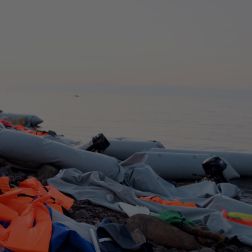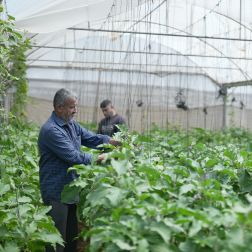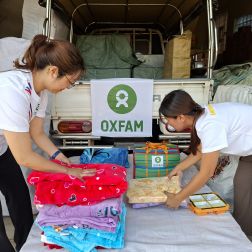- 7 mins read time
- Published: 19th May 2020
A Kenyan mother’s solitary battle with hunger and COVID- 19
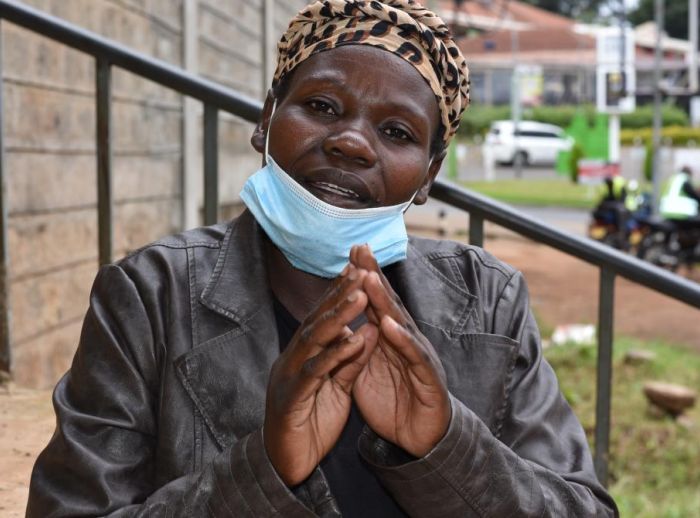
Blog post by Blandina Ijecha Bobson Oxfam Great Britain
Life before COVID-19 was good, according to 38-year-old mother Beatrice Achungo Mbendo.
Beatrice is a single mother with four children aged between two and 13 years old, and she is five months pregnant with her fifth child. She lives in Kangemi, one of the informal settlements in Nairobi. She arrived in 2007- the same year she started engaging in paid domestic work to earn a living. Beatrice is what’s known as a “stone lady”- a name used to describes women - mostly from the informal settlements - who sit on stones in leafy suburbs of Nairobi and wait for middle-class citizens to offer them casual domestic jobs- a trade Beatrice has used to provide education, shelter, food and healthcare for her family since 2007.
Beatrice’s’ husband was employed when they met in 2007 but lost his job after two years. He then struggled to maintain a steady stream of informal jobs in the construction industry until the couple eventually separated.
“My husband left me five months ago after we found out I was two weeks pregnant. He wasn’t happy about it. I have tried to look for him, but nobody knows where he is, including his family”.
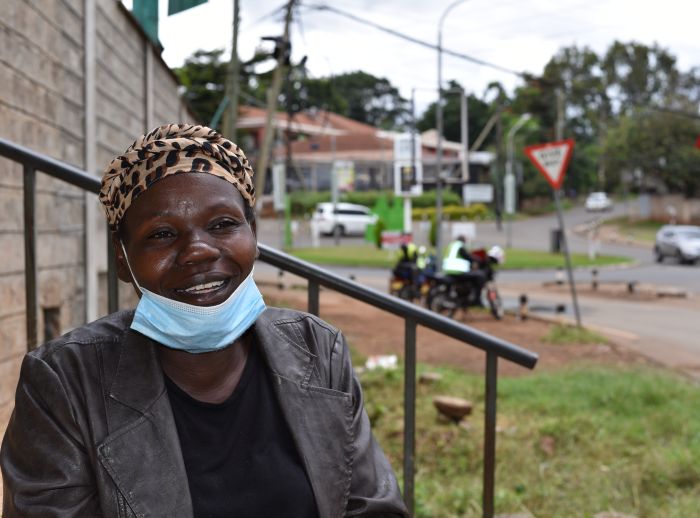
“Stone Ladies” left out in the cold
“Even if we couldn’t afford a good diet, we had three meals a day.” She had four regular clients from whom she earned at least KES 3500 (or about 33 USD) weekly. She would spend the money to meet her family’s basic needs and save some of the money for rent.
“Now things are really bad, we even miss breakfast in the morning. My children would eat something small during lunch and wait for me with the hope that I will come back with something in the evening. If I don’t come back with anything, we sleep hungry. Things are really bad. I am single parent, in my condition with nothing and no one to turn to.”
One time her family of five went for two days without food. She was so distraught that she left her house in tears to look for something to eat. “God heard my cries. One employer brought us 2 kgs of maize flour, sugar and cooking oil which got me through for a few days.”
As governments worldwide are fighting tooth and nail against COVID-19, domestic workers like Beatrice are spending sleepless nights worrying about where their family’s next meal will come from. The pandemic has dealt a huge blow to domestic workers as their employers have taken all necessary measures to keep their families safe, including letting go domestic workers that managed their homes before COVID-19 struck.
Beatrice says that her life changed the minute the government announced the first confirmed COVID-19 case.
“All my employers called me and cancelled on me. They told me to wait until COVID-19 has been contained then they will call me for work. It’s been two months since I last went to anyone’s house to do laundry and clean.”
Her landlord hasn’t spared her either. He has been calling her to ask for the two months’ rent she already owes.
“I explained to him that I don’t have any work. Every morning I go to the waiting place hoping to get something but nothing. There are so many of us waiting and hoping to get work.”
She openly admits that she prioritises any money she gets for feeding her children. Rent is currently not a priority over their survival. If the worst comes to the worst, she is ready to sleep in a ditch with her children as long as they have food.
Unemployed caregivers ‘collateral damage’ in GoK fight against Covid-19
Beatrice explained that because of COVID-19, the local administration and the police have been chasing them and asking them to go and stay at home until the disease is contained.
“But we can’t, we have widows here, you have single parents like me and even those who have spouses, their spouses have lost their jobs. There’s no way we can stay at home. The only thing that makes us come here every day even when the police chase us is the kids. When they chase us, we just go into hiding and come back. We just hope to get even a kilogram of maize flour per day.”
Beatrice says she diligently practices all the measures endorsed by the government to protect her family. Every morning when she leaves her house, she reminds her children to play in the house or just outside the door. When she gets to the waiting place, she doesn’t shake anyone’s hands, tries to maintain social distance and has a mask to cover her mouth and nose.
“When I buy the piece of soap for washing clothes, whatever remains I tell my children to use it to wash their hands. I have taught my children the importance of washing hands and they have put that into practice. When they started talking about COVID-19, I was working for a Doctor. His wife gave me a mask. It’s a disposable mask, but I wash it when I get home and hang it to dry - I can’t afford to buy a mask every day.”
Even as she and the other “stone ladies” undertake the preventive measures, Beatrice says none of them knows anyone who has been taken ill. They are just surprised how a disease that neither of them has suffered from has changed everything. The face of COVID-19 for them is joblessness and hunger.
The government stimulus package has not benefited her even though she was among the people who were registered to benefit. She highlighted that she has heard from her neighbours that some people had received food aid (2kgs of beans, 3 packets of maize flour, 2kgs of sugar and 1 litre of cooking oil), and some had received KES 2000 on their mobile phones. She feels the targeting and distribution wasn’t done in a transparent and accountable manner. She also hasn’t felt the benefit of the reduction in taxes.
“Even if they reduced taxes on food, if you are not working how does that benefit you? You have to work to get money to go and buy food to benefit from the tax reductions.”
An uncertain future for six
Given a chance, Beatrice would like to tell the government that:
“We have COVID-19 in the country and everyone wants it contained. The president can lock the county for two months but before that, he should ensure that they conduct an exercise similar to census and list all the households with vulnerable women like me, then give us food aid enough to last us two months. We will lock ourselves and stay with our children at home for two months until the disease is contained. But if they can’t do this, they should just let us work.”
For now, Beatrice has no plans for the future on how to cope with the impact of COVID-19.
“I just sit by myself and tell God, I have nothing. I have no plans. If I don’t get anything from well-wishers, I won’t hide; my kids and I will sleep hungry. If this continues like this, the only thing left is death. I feel like my life has hit rock bottom.”

This disease knows no borders and does not discriminate. For the world’s poorest and most vulnerable, the worst is yet to come as the coronavirus begins to establish itself and spread quickly through communities powerless to stop it, without access to water, sanitation or healthcare.
Together, we can save lives.

